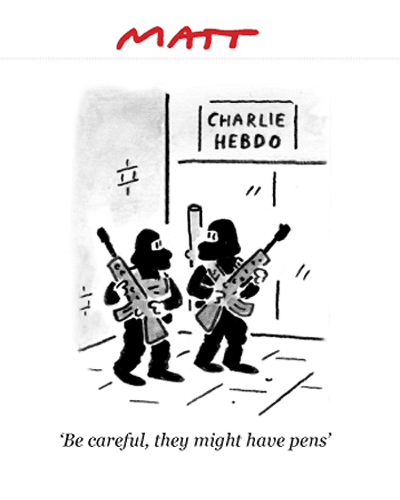I know I wasn't actually in Paris with those thousands of people who gathered in the Place de la Concorde, then marched for freedom of speech. But we watched it on televison and online, and I wanted to show my solidarity as best I could: this blog and these images are the least we can do.
If you're not up to date with the news about the brutal terrorist attack on the offices of the satirical magazine Charlie Hebdo (which means Weekly Charlie) you can catch up on the BBC website. There is an inspiring gallery of photos of the march on the Mirror's website.
Despite the tragedy of the deaths inflicted by the extremists, it has been heartening to see the enormous outpouring of support by those of many faiths or none; by the citizens of Paris and all over the world, and by political or religious leaders as well. See both The Guardian and The Independent.
 The phrase Je suis Charlie ("I am Charlie") has been taken up to represent the feeling that the attack on the staff of an outspoken magazine, whether you agreed with their opinions or not, whether you thought their satirical cartoons were offensive or not, was an attack on everyone who believes that nevertheless they had a right to express those opinions - that we all have the right to freedom of speech for which France's Voltaire campaigned in the 18th century.
The phrase Je suis Charlie ("I am Charlie") has been taken up to represent the feeling that the attack on the staff of an outspoken magazine, whether you agreed with their opinions or not, whether you thought their satirical cartoons were offensive or not, was an attack on everyone who believes that nevertheless they had a right to express those opinions - that we all have the right to freedom of speech for which France's Voltaire campaigned in the 18th century.How poignant that the massacre took place in France, the Republic whose slogan is Liberté, Égalité, Fraternité (Freedom, Equality, Brotherhood).
Cartoonists have been in the forefront of the response as well. There are several collections of these online: by the BBC, by Creative Review, by Buzzfeed, and by CNN among others. Do have a look. Above is just one example from the Telegraph. The artist's pencil has also become an iconic symbol of free expression, and appears in many of the cartoons.
But why "Charlie"? If you checked the link at the start of this post, to Wikipedia on the magazine, you'll have learned already that it was a new name for an older journal which had been banned, an in-joke about Charles de Gaulle, and a reference to Charlie Mensual (Monthly Charlie) which published the Peanuts cartoon strip, featuring Charlie Brown. Despite Sarah Palin's howler, the original character had nothing whatsoever to do with the extremists' attack this month.
 The Peanuts cartoons, drawn by Charles M. Schulz, include several other characters. Our favourite is Snoopy, a beagle who was often portrayed on top of his kennel over a
typewriter, seeking inspiration. He started many a novel, all with the classic sentence, "It was a dark and stormy night." Yes, I know that's a digression... But it wouldn't be a proper Monkey's blog without one at all.
The Peanuts cartoons, drawn by Charles M. Schulz, include several other characters. Our favourite is Snoopy, a beagle who was often portrayed on top of his kennel over a
typewriter, seeking inspiration. He started many a novel, all with the classic sentence, "It was a dark and stormy night." Yes, I know that's a digression... But it wouldn't be a proper Monkey's blog without one at all.
This cartoon is by Australian David Pope of the Canberra Times. Clever - and chilling.
Below is an original Schultz cartoon, plus caption by Magnus Shaw: Charlie has the last word.


.gif)

